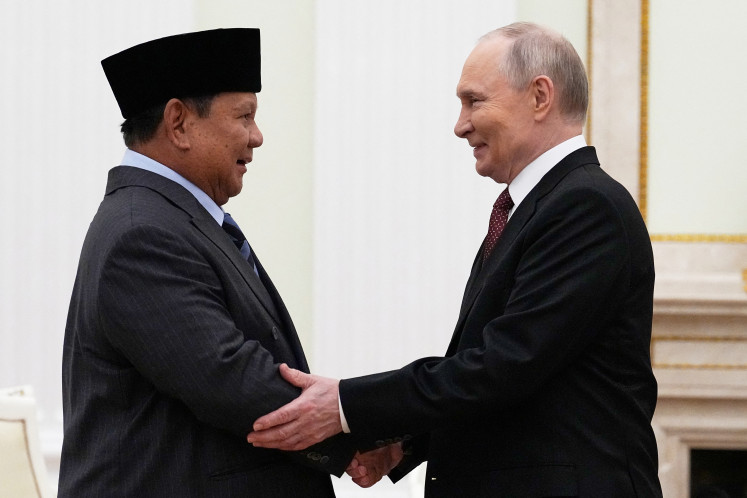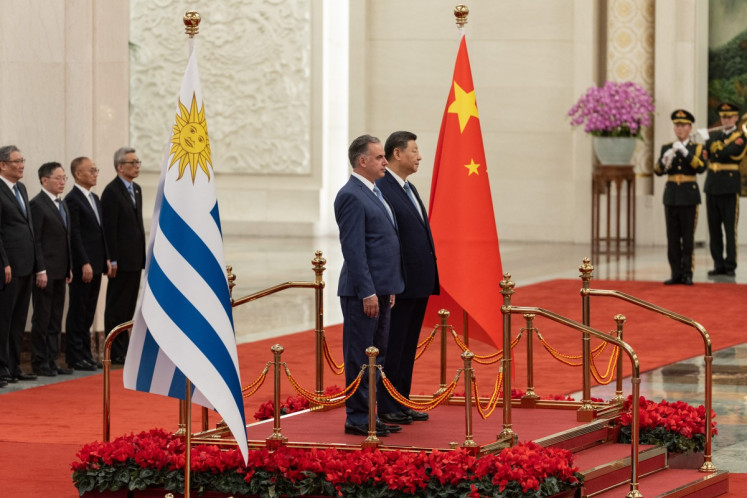Popular Reads
Top Results
Can't find what you're looking for?
View all search resultsPopular Reads
Top Results
Can't find what you're looking for?
View all search resultsOn Oscars and ASEAN
It is no big secret that the sociocultural pillar is one of the most overlooked portfolios in the ASEAN ecosystem.
Change text size
Gift Premium Articles
to Anyone
T
he twin triumphs of 60-year-old Malaysian actress Michelle Yeoh and Vietnamese-American émigré Ke Huy Quan, 51, for their award-winning roles at this year’s Academy of Motion Picture Arts and Sciences event should also be a win for Southeast Asia, but it is not apparent. In an age where representation in popular culture is moving away from the Caucasian archetype and embracing the increasingly diverse, it is still too easy to slip into nondescript labels such as black or Asian.
It would be easy to conflate the gushing of Malaysian pride as Asian when watching the footage of Michelle’s mother in Kuala Lumpur celebrating her daughter’s win at a local viewing party. The Southeast Asian Queen, as some endearingly call Michelle, owes her acting career to the Hong Kong martial arts film scene, rather than her native Malaysian cinema. It took a Bond movie in 1997 for her to break into Hollywood (Tomorrow Never Dies).
For Quan the Comeback Kid, Hollywood does not do justice to his Vietnamese roots either, and people still manage to butcher his name. Having lived through early Asian stereotypes of coming “fresh off the boat” from a refugee camp in Hong Kong, Quan was plucked out of obscurity to star as Short Round in Indiana Jones and the Temple of Doom, and later as Data in The Goonies, giving his family a lifeline to pursue the American Dream. His return to acting two decades later, after giving up due to a lack of work for Asian actors, was seen more as the culmination of the everyman’s dream.
In both instances, what is celebrated is the emergence of Asians in the truncated American context. But that did not stop a whole region of the world from erupting with pride and joy when seeing the two of them win pop culture’s biggest prizes.
Michelle’s acceptance speech was important to hear, especially for the “little boys and girls who look like” her, regardless of whether she was giving the nod to her Hokkien, Cantonese or Malaysian roots. Beyond this cross-section of Asian-ness, Southeast Asians everywhere rooted for her, all at once.
It is a shame ASEAN, the region’s de facto, and rather serious, body politic, is still not able to achieve the same level of Southeast Asian pride in the last 55 years that Michelle and Quan have in less than two years. The truth is culture and identity are still underappreciated topics in ASEAN.
This predicament can clearly be seen in the choice of slogan for Indonesia’s chairmanship of ASEAN this year. ASEAN Matters: Epicentrum of Growth only takes into account the political and economic aspects of the ASEAN trinity of pillars. (The sociocultural pillar is the third).
On one hand, ASEAN Matters is something Foreign Minister Retno LP Marsudi pushed hard to make part of the slogan, while captains of industry wanted something more closely tied to the bloc’s contemporary role. As a result, Epicentrum of Growth was added. But again, the sociocultural aspect was absent, although the Foreign Ministry might argue ASEAN Matters is a catchall phrase.
It is no big secret that the sociocultural pillar is one of the most overlooked portfolios in the ASEAN ecosystem. Even in individual member states, journalists may have a hard time understanding what officials working on this pillar actually do.
What happens is that ASEAN’s citizens are left on their own to cultivate these sociocultural ties. The ASEAN Literary Festival and the ASEAN Music Showcase are mostly handled by grassroots communities. One might ask why you do not hear much about a collectively organized ASEAN Film Festival, despite Southeast Asian cinema having its moment on streaming platforms globally.
We know ASEAN is still very much an ivory tower, but the sociocultural pillar is still important. With the diversity of our cultures, why would ASEAN leaders think we could do without institutional support? Without it, does ASEAN really matter to Southeast Asians?
At the very least, they could have made a fuss about congratulating their Oscar-winning cohorts.











